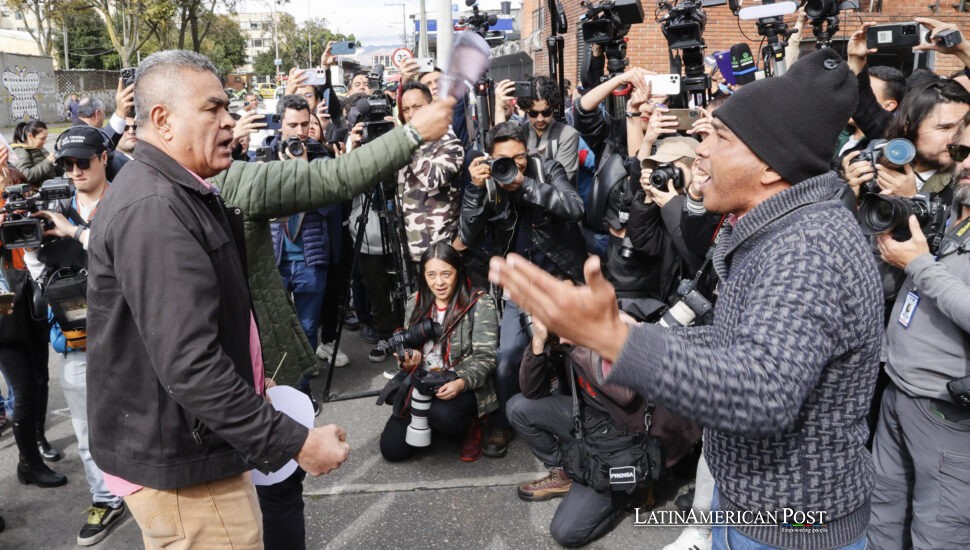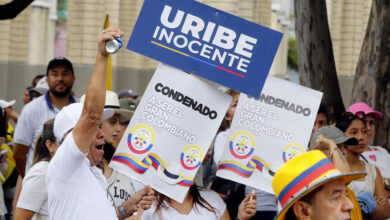Colombia on Trial: How the Uribe Verdict Split a Nation’s Conscience

A Bogotá courtroom has shaken Colombia to its democratic core, convicting the man who once tamed guerrillas and commanded near-mystical authority—forcing the country to reckon with what it gained, what it lost, and what comes next.
A Political Earthquake with No Safe Ground
The moment Judge Sandra Heredia delivered her verdict—guilty of procedural fraud and witness tampering—it wasn’t just Álvaro Uribe who stood on trial. It was the scaffolding of modern Colombia: its political loyalties, its legal system, its identity. For decades, Uribe had towered over the country’s public life. From the presidential palace to late-night radio, from rural outposts to global summits, his name became synonymous with both national salvation and unchecked power. Now, at 73, Colombia’s most polarizing figure has been formally branded a criminal.
The ruling drops into a country still nursing its divisions. Uribe’s party, Centro Democrático, reels from the blow. His conservative base has launched a campaign to cast the judge’s decision as a vendetta—a legal ambush orchestrated by magistrates with ideological agendas. Meanwhile, supporters of current President Gustavo Petro, long Uribe’s political rival, see vindication: evidence, they argue, that Colombian democracy has finally matured enough to hold its icons accountable.
What’s clear is that the ripple effects will stretch well beyond legal appeal. With municipal elections on the horizon and the next presidential race already casting long shadows, every political actor must now declare where they stand on what has quickly become the new national litmus test: Uribe—victim or villain?
The Shadow of Power: War, Peace, and What Was Lost
To understand the weight of Uribe’s conviction, one must revisit what he meant to Colombia’s modern myth. When he took office in 2002, the country teetered on the brink of collapse. Guerrillas surrounded Bogotá’s outskirts, kidnappings were routine, and many rural towns were effectively lawless.
Uribe responded with force. His Democratic Security policy unleashed a wave of military operations that drove the FARC into the jungles and slashed kidnappings by nearly 90%. Homicide rates dropped by half. For many Colombians, these were years of salvation. Commerce flourished. Roads reopened. Foreign investment surged, and Bogotá began to resemble the capital of a nation on the mend.
But the same policies that brought order also exacted a price. Under his watch, army units executed thousands of civilians—at least 6,400, according to the Truth Commission—dressing them as guerrillas to inflate combat success. These were the infamous “falsos positivos,” a grotesque byproduct of performance quotas. Intelligence agencies were caught wiretapping journalists and judges. Paramilitary groups were nominally disarmed but often reconstituted as mafia-style criminal networks.
Uribe’s legacy, then, is jagged. To his followers, he remains the man who saved the nation from chaos. To his critics, he normalized impunity and blurred the lines between state power and coercion. That both can be true at once is part of what continues to tear Colombia in two.
A Trial Years in the Making
The road to Uribe’s conviction did not begin with a bombshell—it started with a lawsuit. In 2012, Uribe accused leftist senator Iván Cepeda of bribing witnesses to falsely tie him to 1990s paramilitary death squads falsely. But instead of vindicating Uribe, the case backfired. The Supreme Court not only cleared Cepeda but also opened an investigation into Uribe himself.
What followed was a slow unraveling. Recordings surfaced of Uribe’s lawyer, Diego Cadena, offering legal favors and cash to prison inmates in exchange for favorable testimony. According to the court, these weren’t rogue acts—they were part of a deliberate strategy, with Uribe acting as intellectual architect. Judge Heredia described it as a “coordinated scheme to subvert judicial truth.”
The sentence—likely between four and eight years of house arrest, pending appeal—is historic. No Colombian president had ever been convicted of a crime. But beyond the headline, legal analysts note a subtler victory: the increasing independence of a judiciary once cowed by violence, political pressure, and public fear.
In her ruling, Heredia called Uribe “the most powerful man in Colombia.” The fact that her voice, in a courtroom, could pierce that power and find him guilty—without military backlash, without mobs in the street—is perhaps the verdict’s most important legacy.
Democracy at a Crossroads
What comes next may define Colombia for a generation.
On one hand, the verdict could signal a new era—one in which former strongmen are no longer immune, where courts can prosecute not just guerrilla commanders but the state’s titans. President Petro, whose own reforms have stalled in Congress, may now find renewed energy to push legislation on rural land reform, police oversight, and civilian control of the military.
But temptation lurks. For Petro’s camp, there’s the allure of revanche—a political cleansing masquerading as justice. For Uribe’s defenders, the instinct will be to delegitimize the judiciary, to turn the courts into villains and spark institutional gridlock. Both risks are real. Both could undo the fragile gains of this moment.
Uribe’s conviction should not become an excuse to burn bridges. Colombia still needs a functioning right-wing opposition. It still needs military leaders who feel respected, not besieged. It still needs a judicial system that doesn’t buckle under political pressure. What it cannot afford is to slide into tit-for-tat legalism, where each administration weaponizes accountability for vengeance.
The more profound lesson may be this: justice, to work, must be trusted. And that trust is fragile, built slowly, but lost in an instant.
In the end, the verdict against Álvaro Uribe doesn’t rewrite history. It doesn’t cancel his battlefield victories, nor does it absolve the state of the wounds still unhealed from his tenure. What it does is ask the country to grow up—to move beyond mythology, beyond slogans, beyond fear.
Also Read: Brazil’s Supreme Court Pushback Signals a Nation Unwilling to Trade Justice for Tariff Relief
Uribe once shaped Colombia through sheer will, through charisma and calculation, through battles both literal and political. Now, stripped of his aura and facing confinement, he becomes something else: a mirror. One that forces Colombia to ask what kind of democracy it wants, what kind of justice it believes in, and whether it’s finally ready to build a nation where no one is above the law—not even the man who once acted like he was.


